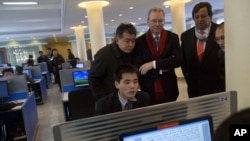North Korea has provided a small group of Americans with a rare look at the few people who can access the Internet in the tightly-controlled and impoverished state.
The private delegation of Google executives and former New Mexico state governor Bill Richardson were given a tour of an Internet lab Tuesday at Pyongyang's Kim Il Sung University. They spoke with several students, who could be seen using Google to look for information online.
North Korea's authoritarian government bars the vast majority of citizens from accessing the Internet to shield them from foreign influences. But in recent years, it has permitted some students of elite universities to search the Web under strict conditions and monitoring.
The American delegation arrived Monday in Pyongyang on a four-day visit that Richardson described as "humanitarian." The U.S. State Department has criticized the trip, calling its timing "unhelpful."
The visit follows North Korea's test-launch of a long-range rocket last month - a move denounced by Washington as a threat to regional security and a violation of U.N. Security Council resolutions.
Pyongyang said the test is part of a peaceful program to send a satellite into space. But Washington sees it as a bid to develop long-range missiles capable of striking the United States.
Richardson met with North Korean foreign ministry officials and described the talks as "good, productive, but frank." He did not elaborate.
In an article published Tuesday in the New York Daily News, former U.S. ambassador to the United Nations John Bolton said Richardson and the Google executives have "joined a long list of Americans and others used by [North Korean leader Kim Jong Un's] family dictatorship for political advantage."
Bolton said a better humanitarian approach to North Korea would be to "undercut and end" that dictatorship, rather than provide assistance that "perpetuates" it.
South Korean foreign ministry spokesman Cho Tai-young said Seoul hopes the Americans' visit will promote "peace and stability" on the Korean peninsula.
The private delegation of Google executives and former New Mexico state governor Bill Richardson were given a tour of an Internet lab Tuesday at Pyongyang's Kim Il Sung University. They spoke with several students, who could be seen using Google to look for information online.
North Korea's authoritarian government bars the vast majority of citizens from accessing the Internet to shield them from foreign influences. But in recent years, it has permitted some students of elite universities to search the Web under strict conditions and monitoring.
The American delegation arrived Monday in Pyongyang on a four-day visit that Richardson described as "humanitarian." The U.S. State Department has criticized the trip, calling its timing "unhelpful."
The visit follows North Korea's test-launch of a long-range rocket last month - a move denounced by Washington as a threat to regional security and a violation of U.N. Security Council resolutions.
Pyongyang said the test is part of a peaceful program to send a satellite into space. But Washington sees it as a bid to develop long-range missiles capable of striking the United States.
Richardson met with North Korean foreign ministry officials and described the talks as "good, productive, but frank." He did not elaborate.
In an article published Tuesday in the New York Daily News, former U.S. ambassador to the United Nations John Bolton said Richardson and the Google executives have "joined a long list of Americans and others used by [North Korean leader Kim Jong Un's] family dictatorship for political advantage."
Bolton said a better humanitarian approach to North Korea would be to "undercut and end" that dictatorship, rather than provide assistance that "perpetuates" it.
South Korean foreign ministry spokesman Cho Tai-young said Seoul hopes the Americans' visit will promote "peace and stability" on the Korean peninsula.





